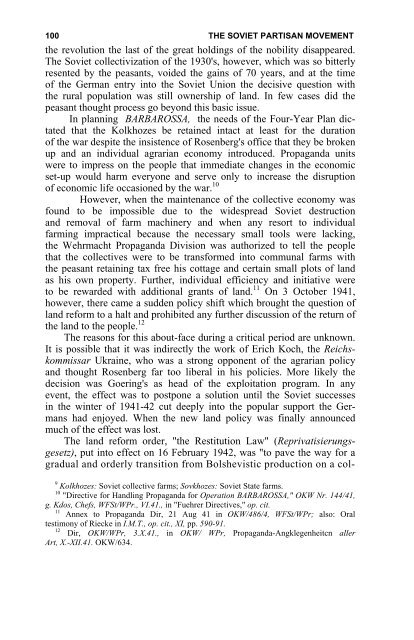the soviet partisan movement 1941-1944 by edgar m. howell
the soviet partisan movement 1941-1944 by edgar m. howell
the soviet partisan movement 1941-1944 by edgar m. howell
You also want an ePaper? Increase the reach of your titles
YUMPU automatically turns print PDFs into web optimized ePapers that Google loves.
100 THE SOVIET PARTISAN MOVEMENT<br />
<strong>the</strong> revolution <strong>the</strong> last of <strong>the</strong> great holdings of <strong>the</strong> nobility disappeared.<br />
The Soviet collectivization of <strong>the</strong> 1930's, however, which was so bitterly<br />
resented <strong>by</strong> <strong>the</strong> peasants, voided <strong>the</strong> gains of 70 years, and at <strong>the</strong> time<br />
of <strong>the</strong> German entry into <strong>the</strong> Soviet Union <strong>the</strong> decisive question with<br />
<strong>the</strong> rural population was still ownership of land. In few cases did <strong>the</strong><br />
peasant thought process go beyond this basic issue.<br />
In planning BARBAROSSA, <strong>the</strong> needs of <strong>the</strong> Four-Year Plan dictated<br />
that <strong>the</strong> Kolkhozes be retained intact at least for <strong>the</strong> duration<br />
of <strong>the</strong> war despite <strong>the</strong> insistence of Rosenberg's office that <strong>the</strong>y be broken<br />
up and an individual agrarian economy introduced. Propaganda units<br />
were to impress on <strong>the</strong> people that immediate changes in <strong>the</strong> economic<br />
set-up would harm everyone and serve only to increase <strong>the</strong> disruption<br />
of economic life occasioned <strong>by</strong> <strong>the</strong> war. 10<br />
However, when <strong>the</strong> maintenance of <strong>the</strong> collective economy was<br />
found to be impossible due to <strong>the</strong> widespread Soviet destruction<br />
and removal of farm machinery and when any resort to individual<br />
farming impractical because <strong>the</strong> necessary small tools were lacking,<br />
<strong>the</strong> Wehrmacht Propaganda Division was authorized to tell <strong>the</strong> people<br />
that <strong>the</strong> collectives were to be transformed into communal farms with<br />
<strong>the</strong> peasant retaining tax free his cottage and certain small plots of land<br />
as his own property. Fur<strong>the</strong>r, individual efficiency and initiative were<br />
to be rewarded with additional grants of land. 11 On 3 October <strong>1941</strong>,<br />
however, <strong>the</strong>re came a sudden policy shift which brought <strong>the</strong> question of<br />
land reform to a halt and prohibited any fur<strong>the</strong>r discussion of <strong>the</strong> return of<br />
<strong>the</strong> land to <strong>the</strong> people. 12<br />
The reasons for this about-face during a critical period are unknown.<br />
It is possible that it was indirectly <strong>the</strong> work of Erich Koch, <strong>the</strong> Reichskommissar<br />
Ukraine, who was a strong opponent of <strong>the</strong> agrarian policy<br />
and thought Rosenberg far too liberal in his policies. More likely <strong>the</strong><br />
decision was Goering's as head of <strong>the</strong> exploitation program. In any<br />
event, <strong>the</strong> effect was to postpone a solution until <strong>the</strong> Soviet successes<br />
in <strong>the</strong> winter of <strong>1941</strong>-42 cut deeply into <strong>the</strong> popular support <strong>the</strong> Germans<br />
had enjoyed. When <strong>the</strong> new land policy was finally announced<br />
much of <strong>the</strong> effect was lost.<br />
The land reform order, "<strong>the</strong> Restitution Law" (Reprivatisierungsgesetz),<br />
put into effect on 16 February 1942, was "to pave <strong>the</strong> way for a<br />
gradual and orderly transition from Bolshevistic production on a col-<br />
9<br />
Kolkhozes: Soviet collective farms; Sovkhozes: Soviet State farms.<br />
10 "Directive for Handling Propaganda for Operation BARBAROSSA," OKW Nr. 144/41,<br />
g. Kdos, Chefs, WFSt/WPr., VI.41., in "Fuehrer Directives," op. cit.<br />
11<br />
Annex to Propaganda Dir, 21 Aug 41 in OKW/486/4, WFSt/WPr; also: Oral<br />
testimony of Riecke in I.M.T., op. cit., XI, pp. 590-91.<br />
12<br />
Dir, OKW/WPr, 3.X.41., in OKW/ WPr, Propaganda-Angklegenheitcn aller<br />
Art, X.-XII.41. OKW/634.
















